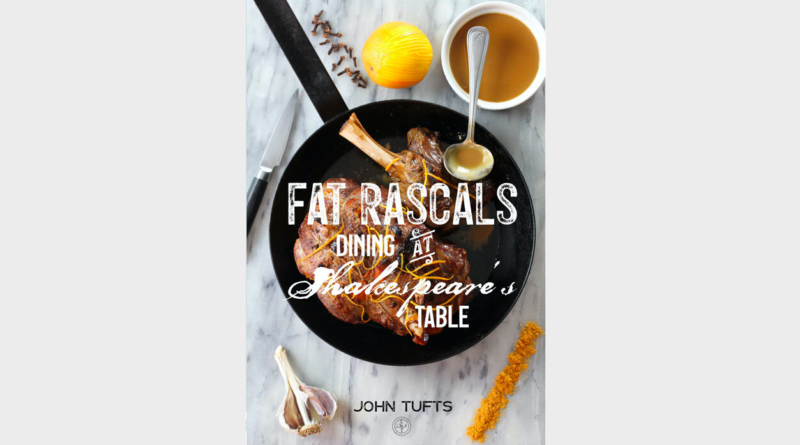REVIEW: ‘Fat Rascals: Dining at Shakespeare’s Table’ by John Tufts
Image courtesy of John Tufts / Provided by official website.
John Tufts, an accomplished actor with a particular expertise in performing William Shakespeare’s words, has expanded his love of the Bard and developed a delicious new project. Fat Rascals: Dining at Shakespeare’s Table is a thoughtful historical trip into the culinary heart of Shakespeare and his plays. Throughout these pages, encompassing stories from Tufts and recipes influenced by the British playwright, there are many wonderful tie-ins to the Bard’s plays and the overall time period of the late 16th century / early 17th century in England.
These recipes, which include ingredient lists, directions and carefully curated notes by the author, are not pulled directly from Shakespeare’s plays. They are inspired and influenced by certain lines of dialogue that characters say within the Bard’s dramatic, comedic and historic tomes. For example, Anne Page, in Merry Wives of Windsor, says, “Good mother, do not marry me to yond fool. I had rather be set quickly i’th’earth and bowl’d to death with turnips.” This line of dialogue prompts Tufts to concoct a “simple turnip recipe” that is billed as both traditional and delicious.
Another recipe, this one for calvered trout, is inspired by Measure for Measure and a line offered by Pompey. In the play, he answers Mistress Overdone’s question about a perceived offense with, “Groping for trouts in a peculiar river.” Many of the recipes come from the history plays by Shakespeare, and in particular from scenes featuring Falstaff, that iconic character who seems to always be talking about food.
Some of the recipes are inspired by historic cookbooks, such as Robert May’s The Accomplisht Cook and Gervase Markham’s The English Housewife. In Tufts’ introduction, he also gives credit to Peter Brears’ Cooking and Dining in Tudor and Early Stuart England.
Rather than presenting each dish according to its purely historic preparation and presentation, which would likely lead to sour palates and furrowed brows in the 21st century, Tufts updates a few of the recipes and tries to make each one as workable as possible. His ingredients are mostly still found in grocery stores, with a few special items that one can go searching for in quality markets. Of his many entries, some stand out as highly doable and no doubt highly scrumptious. There’s a chicken salad recipe that is simple yet refined, and his “Grand Salad of Divers Compounds” seems like a necessity for any culinary purist. The roast wild boar, roast capon, stock fish and fried halibut are more extensive creations, and for some readers will be appreciated from afar.
The food is categorized by type into easy-to-read chapters that have accompanying photography of both the ingredients in their raw form and finished products. Readers can expect selections of kickshaws and pasties, salads and vegetables, pottages and soups, meat and poultry, game and fish, breads and pastries, preserves and condiments, and, of course, some drinks.
The entire book, which comes with the endorsement of several directors who have worked with Tufts over the years, is clearly a labor of love. The writing is his, the photography is his, and the limited run of these delectable cookbooks is his. He even owns up to some inevitable mistakes that populate a page or two (there are not nearly as many as his warning would portend).
Fat Rascals: Dining at Shakespeare’s Table is a must read for lovers of Shakespeare’s plays and lovers of modern takes on historic recipes. If readers find themselves checking off both those categories, they are definitely in for a feast.
By John Soltes / Publisher / John@HollywoodSoapbox.com
Fat Rascals: Dining at Shakespeare’s Table by John Tufts. 200 pages. Click here for more information.

